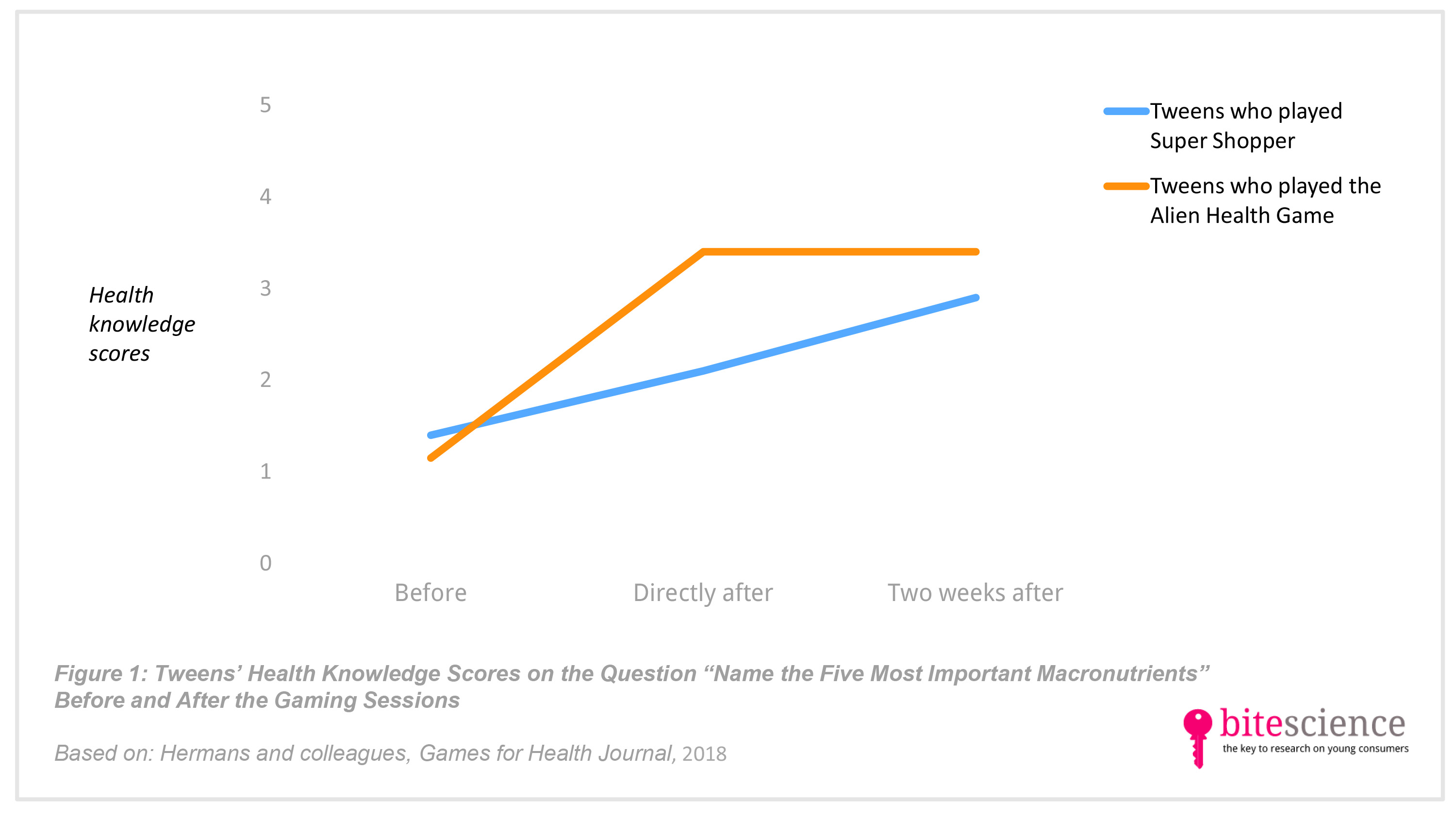
Playing for Profit? Food Education Game Only Temporarily Boosts Tweens’ Food Knowledge
The large number of tweens not meeting the recommendations for a healthy diet is alarming and suggests nutrition education is crucial. The Alien Health Game is designed for this purpose and teaches tweens about the five central macronutrients of food: fibers, vitamins, carbohydrates, proteins, and fats. Although the game can temporarily boost tweens’ food knowledge, this effect does not last nor does it translate to tweens’ healthy food choices, a study in Games for Health Journal shows.
Take aways
- Playing the Alien Health Game boosts tweens’ knowledge about the five macronutrients of food, but only temporarily.
- On the longer term, there are no beneficial effects of the game on tweens’ food knowledge and healthy food choices.
- As eating behavior is strongly embedded in the social context, one direction for further development of the game would be to involve tweens’ parents and peers.
Study information
The question?
Does playing the Alien Health Game stimulate tweens’ knowledge about food and healthy food choice?
Who?
108 tweens aged 10 to 13 years old (mean age: 11 years; 46% girls)
Where?
The South of the Netherlands
How?
Tweens were divided in two groups. The first group played the Alien Health Game, of which the goal was to keep an alien healthy so that it was able to save other planets in need. Tweens could do this by choosing to feed the alien with high- instead of low-nutritious foods. The other group of tweens played Super Shopper, in which they shopped around in a supermarket. For each of the groceries tweens chose in the game they received information about its nutritional value. All tweens played the game at their school in two 30-minute sessions that took place one day apart.
Before the first gaming session, directly after the second session, and two weeks later tweens completed a food knowledge test consisting of these questions:- Name the five most important nutrients of food (open-ended);
- For each macronutrient, identify its main function (multiple choice);
- Identify the healthiest option out of two foods (e.g., corn flakes vs. oat meal, 20 food pairs in total).
Moreover, after the second gaming session and two weeks later tweens did a “taste test” to assess their food choice. They were free to taste healthy (grapes, cucumber) and unhealthy (potato chips, chocolate candies) foods. For both food categories, the researchers calculated the total amount tweens ate.
Facts and findings
Tweens’ knowledge about food
- Directly after the gaming sessions, tweens who played the Alien Health Game named more macronutrients correctly than tweens who played Super Shopper.
- However, this effect disappeared after two weeks, meaning that by then, tweens in both groups performed equally well on that question (see Figure 1).
- Neither of the groups improved in identifying the function of macronutrients directly after playing the game or two weeks later.
- One explanation for this finding could be that tweens in both groups already scored quite high on the knowledge test before the gaming sessions, indicating that there was little room for improvement.
Tweens’ food choices
- Over time, tweens in both groups (so not only those who played the Alien Health Game) became better at identifying the healthier option out of two hypothetical food choices.
- However, this increase in teens knowledge about healthy food options did not translate into healthier food choices. On the contrary, tweens in both groups ate more unhealthy foods during the second taste test (after two weeks) as compared to the first (immediately after playing the game).
- The researchers suggest that this was because tweens experienced no social control (e.g., by a parent or teacher) during the first taste test. Based on this experience tweens created a personal norm on which they based their food intake during the second taste test. As a result, they consumed more high-caloric snacks than they did the first time.
- Critical note: As the study did not have a none-gaming control group (in which tweens only complete the tests but did not play any game), it cannot be concluded that playing the Alien Health Game is more beneficial than receiving no food education at all.
